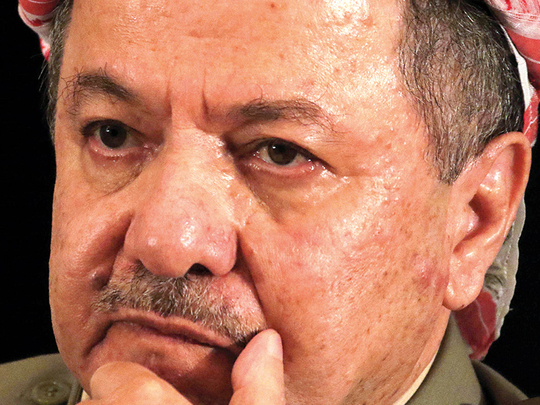
On Sunday, veteran politician and President of Kurdistan Regional Government (KRG) Masoud Barzani indirectly acknowledged that he had played for the highest stakes of his political life — and lost miserably.
He announced that he would not extend his term beyond November 1. A charitable view holds that Barzani’s move had nothing to do with the referendum, as he had spoken about not extending his term earlier this year. However, the fact is no one expected Barzani to keep his word. His announcement is a direct result of the Iraqi, regional, and international backlash against the KRG.
In his bitter speech on Sunday, a morose Barzani lamented: “Three million votes for Kurdistan independence created history and cannot be erased,” referring to the referendum held on September 25. “Nobody stood up with us other than our mountains.”
The Barzani clan has been at the centre of Iraqi Kurdish politics for decades. Like his father Mustafa Barzani before him, Masoud also fought a guerrilla war against the regime of Saddam Hussain. Almost always clad in traditional Kurdish garb, Masoud Barzani came to symbolise his people’s aspirations and dreams of independence. He has been to the Iraqi Kurds what Yasser Arafat was to the Palestinians.
Masoud Barzani was born in the ‘Republic of Mahabad’ — a Kurdish self-governing state that existed from January 22 to December 15, 1946, in present-day Iran. His father founded the Kurdistan Democratic Party (KDP). After his death in 1979, Masoud Barzani took over the reins of the party, which came to play a dominant role in Kurdish politics. The Iraqi Kurds had already tasted autonomy in the years following the First Gulf War, when Saddam’s troops were driven out of Kuwait.
In 1992, free elections were held in the region and the KDP and the Patriotic Union of Kurdistan got equal votes. They later divided the government ministries between them. But, in a sign of pragmatism, when in 1994 fighting broke out between the peshmerga of the KDP and the PUK, Barzani turned to his arch foe Saddam, and with the help of the Iraqi army, drove the PUK out of major Kurdish cities.
After Saddam was toppled following the 2003 American-led invasion, Barzani was instrumental in carving out the autonomous territory, and became president of Iraqi Kurdistan in 2005. He won another presidential election in 2009, and his term was extended in 2013. Masoud Barzani’s nephew, Nechirvan Barzani, is the KRG prime minister, and son, Masrour, is the head of the KRG’s security apparatus.
So, how is it that a person as experienced as Barzani failed to read the situation, despite clear indications that he had none of the Big Powers backing the Kurdish independence vote, and despite the fact that regional powers like Iran and Turkey were bitterly opposed to it? “Barzani committed political suicide, which has now led to his resignation,” said Mohammad Hineidi, an independent expert on Iraq and the Levant, in an interview with Gulf News. “What he failed to see was the lack of Kurdish unity on the referendum, and the continued divisions between his KDP, and the opposition PUK, which he accused of high treason for the defeat in Kirkuk. Barzani may have also thought that regional, and international opposition to the referendum was only going to be verbal, and if push came to shove, all peshmerga — KDP and PUK alike — would defend Kirkuk, with the assistance of the US forces. Both of which didn’t happen.”
Barzani’s legacy seems to be in tatters as many see his haste in going ahead with the referendum as having destroyed the Kurdish dream of independence, possibly forever. Apart from losing Kirkuk, the borders with Iran and Turkey through which the KRG conducted most of its trade, have also been seized. Hineidi believes that to an extent, Kurdistan’s autonomy is now over.
“The peshmerga and ISF [Iraqi Security Forces] are close to reaching a deal whereby the Kurds hand over all border crossings to Iraqi forces. The central government continues to be able to exert control over Kurdish airspace — closing it down when it wants. In any case, this is the biggest defeat to Kurdish political autonomy, and to future Kurdish aspirations since 1975 ... the balance of power has completely shifted in northern Iraq in favour of Baghdad, and Kurds [have to] sort out their own bitter divisions. However, the Barzanis will likely continue to play a role in the KDP, albeit in a weakened KRG.”












